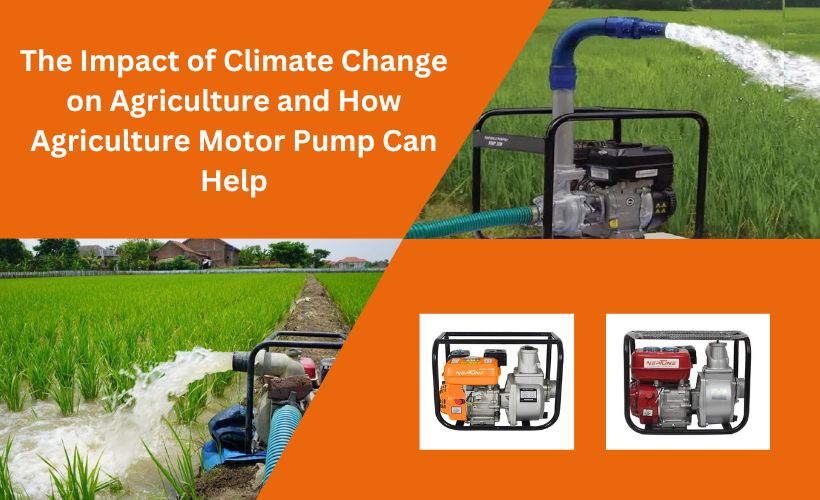Introduction
Climate change is no longer a distant threat; it’s a stark reality affecting every corner of the globe. Agriculture, the backbone of many economies, is particularly vulnerable to its devastating effects. From erratic weather patterns to rising sea levels, the challenges faced by farmers are immense. However, amidst these challenges, technological advancements offer solutions. One such innovation is the agriculture motor pump, a crucial tool in mitigating the effects of climate change on farming.
1. The Growing Threat of Climate Change on Agriculture
1.1 Unpredictable Rainfall Patterns
One of the most significant impacts of climate change on agriculture is the alteration of rainfall patterns. The once-predictable seasons have become erratic, with prolonged droughts or unexpected floods disrupting crop cycles. This unpredictability reduces yields and significant economic losses for farmers who rely on consistent weather patterns to plan their planting and harvesting schedules.
1.2 Rising Temperatures
Increased temperatures due to global warming have far-reaching consequences on agriculture. Crops mature faster under higher temperatures, often before fully developed, leading to reduced crop quality. Moreover, warmer climates are more conducive to the spread of pests and diseases, further threatening crop yields.
1.3 Soil Degradation
Climate change exacerbates soil degradation through processes like erosion, salinization, and nutrient depletion. These changes affect soil fertility, making it increasingly difficult for farmers to maintain high levels of productivity. As the soil quality diminishes, so does the land’s ability to support healthy crop growth.
1.4 Extreme Weather Events
The frequency and intensity of extreme weather events, such as hurricanes, cyclones, and hailstorms, have increased due to climate change. These events can cause widespread damage to crops and farming infrastructure, leaving farmers with devastating losses and little time to recover before the next growing season.
2. The Role of Agriculture Motor Pumps in Combating Climate Change
2.1 Irrigation Optimization
Agriculture motor pumps are essential in optimizing irrigation practices. By delivering water precisely where and when it is needed, these pumps help conserve water during droughts and ensure adequate moisture during dry spells. Efficient water use is critical in regions where water scarcity is becoming more common due to changing climate patterns.
2.2 Flood Management
In areas prone to flooding, agriculture motor pumps play a vital role in managing excess water. These pumps can quickly remove water from fields, preventing waterlogging and reducing the risk of crop damage. Effective flood management is crucial for maintaining crop health and ensuring consistent agricultural output.
2.3 Drought Resilience
During periods of drought, accessing water from deep wells or underground reserves becomes necessary. A diesel water pump for agriculture provides a reliable solution for this, ensuring that crops receive the water they need even when surface water sources dry up. This resilience is key to safeguarding crop yields in drought-prone regions.
2.4 Crop Diversification
With consistent water availability facilitated by farm water pump, farmers can diversify their crops. This diversification reduces the risk associated with relying on a single crop, which may be particularly vulnerable to climate variability. By growing a variety of crops, farmers can spread their risk and improve food security.
3. The Power of Diesel Water Pumps for Farming
3.1 Reliability
Diesel water pumps for farming are known for their reliability, even in challenging conditions. Their robust design and ability to function under various environmental conditions make them an indispensable tool for farmers who face unpredictable weather patterns due to climate change.
3.2 Power
One of the significant advantages of diesel water pumps for farming is their power. These pumps can lift water from deep wells or transport it over long distances, ensuring that even remote or elevated fields receive adequate irrigation. This capability is particularly important in regions where surface water sources are limited.
3.3 Portability
Many diesel water pumps for farming are designed to be portable, allowing farmers to move them easily between different locations. This flexibility is beneficial for large farms or for farmers who manage multiple plots of land. Portability ensures that all areas of a farm can be adequately irrigated, regardless of their location.
3.4 Fuel Availability
Diesel water pumps for agriculture are widely available in rural areas, making them a convenient choice for powering water pumps. Unlike electric pumps, which require access to a stable electricity supply, diesel pumps can operate in remote locations where electricity is not available, providing farmers with a dependable source of power.
4. How to Choose the Right Agriculture Motor Pump
4.1 Assessing Water Needs
Before selecting an agriculture motor pump, farmers should assess their water needs based on the size of their farm, the type of crops they grow, and the availability of water sources. Understanding these factors will help in choosing a pump with the right capacity and power to meet their irrigation requirements.
4.2 Considering Environmental Conditions
The environmental conditions of the farm, including soil type, terrain, and climate, should be considered when selecting a pump. Some pumps are better suited for specific conditions, and choosing the right one can enhance efficiency and longevity.
4.3 Evaluating Energy Sources
Farmers should also consider the energy source for their pump. While diesel water pumps for agriculture offer reliability and power, electric pumps may be more cost-effective in areas with a stable electricity supply. Solar-powered pumps are another option, especially in regions with high solar potential.
4.4 Budget and Maintenance
Cost is always a factor when investing in farm equipment. Farmers should balance the upfront cost of the pump with its maintenance requirements and operational costs. A pump that is more expensive to maintain or run may not be the most economical choice in the long run.
Conclusion
Climate change poses a formidable challenge to agriculture, threatening food security, livelihoods, and sustainability. However, with the right tools and strategies, farmers can adapt and thrive in this changing environment. Agriculture motor pumps, particularly diesel water pump for farming, are essential components of a climate-resilient agricultural system. By optimizing water management, ensuring consistent water availability, and supporting crop diversification, these pumps empower farmers to overcome the challenges posed by climate change and build a sustainable future.
FAQs
Q1: What is the impact of climate change on agriculture?
A: Climate change causes unpredictable rainfall patterns, rising temperatures, soil degradation, and more frequent extreme weather events, all of which negatively impact crop yields and farmer livelihoods.
Q2: How can an agriculture motor pump help in combating climate change?
A: Agriculture motor pumps help by optimizing irrigation, managing floods, ensuring drought resilience, and enabling crop diversification, thereby reducing the negative impacts of climate change on agriculture.
Q3: What are the benefits of using a diesel water pump for farming?
A: Diesel water pumps for farming offer reliability, power, portability, and fuel availability, making them suitable for farmers facing the challenges of climate change.




